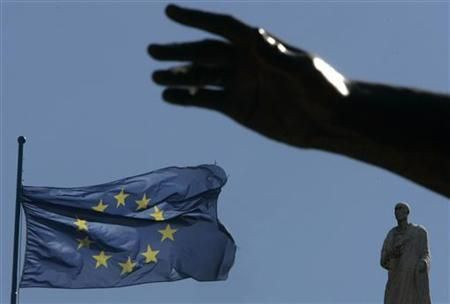Failing on Greece, EU Must Ring-fence Italy
ANALYSIS

One message from financial markets has become quite clear: attempts by the euro zone to ring-fence Greece and stop contagion to other, more significant economies has failed.
The job now in Berlin, Brussels and Paris is not to worry about Greece, which is all but lost, or even bailed-out Dublin and Lisbon.
Instead it is to stop Italy, the world's eighth-largest economy, its third-largest debt market, and a founding member of the European project, from bringing down France and the euro zone as a whole.
In a sense Greece, Portugal, Ireland have been side shows, said Ken Courtis, an investment manager who used to be vice-chairman of Goldman Sachs in Asia.
With Italy, we are moving to the main event. There is simply no way that Italy can conduct the massive refundings it has in the coming weeks with this situation. With these developments, the zone of global risk is set to dramatically increase.
Contagion from Greece has already taken hold despite all the bail-outs, bond discounting and rhetoric that euro zone leaders have poured on the problem in months of excruciatingly slow negotiations and crisis meetings.
Italian yields lurched above 7 percent on Wednesday even though Prime Minister Silvio Berlusconi -- blamed by many for his country's political sclerosis -- has pledged to quit after parliament passes the latest budget reform bill.
Yields above 7 percent are widely viewed as unsustainable -- it was at that level that Portugal and Ireland needed bailouts.
More worrying, however, may be that short-term rates popped above long-term ones -- a so-called inversion of the bond curve that signals deep concern among investors about their money.
NO RETURN
Italy's plight means two things. The first is that, beyond face-saving, Greece no longer matters much to the euro zone.
As a tiny, peripheral economy, it never was that big a deal numerically. The main reason for all the attention it has received was the fear of contagion.
That has now happened. Hence, comments from various euro zone leaders in recent days suggesting that perhaps, after all, Greece could leave the euro zone.
French President Nicolas Sarkozy has even laid out a vision of Europe in which euro zone countries accelerate and deepen their integration while a wider and expanding group outside the currency bloc stays more loosely connected.
At the very least, it shows a willingness to consider a Europe of monetary ins and outs.
The second impact of contagion gripping Italy is that euro zone leaders are suddenly going to have to deal with one of its pillars collapsing rather than just the crumbling garden ornaments outside.
This will be tough and many economists and strategists believe it will in the end come down to the European Central Bank having to act as a lender of last resort, which Germany strongly opposes.
The only institution that can credibly counter a collective loss of confidence on such a scale is the ECB, said Nicholas Spiro, managing director of consultants Spiro Sovereign Strategy. If the ECB does not stand behind Italy and declare its readiness to use unlimited resources to ward off market panic, then France could be the next country to succumb to contagion.
France, indeed, is already gradually breaking away from core European debt markets and its bond yields risk converging with those of the region's most indebted states unless it can convince them its triple-A rating will remain intact.
Yields on 10 year French bonds were at 3.2 percent on Wednesday, nearly twice that of the core German equivalent but still below its year high of around 3.8 percent.
HIGH STAKES
Italy's significance, meanwhile, extends well beyond its 1.9 trillion euros in public debt, a number that makes it simply too big to bail out.
It has totemic significance as one of the six founding members of the forerunner of the European Union. Indeed, the founding document of that group was the 1957 Treaty of Rome.
That history was one of the reasons Italy was let into the euro zone in the first place, a decision that opened the door to a broad currency bloc and not simply a hard core, which is what many German policymakers had favored.
France has also frequently viewed Italy as helping it to form a political counterbalance in the EU to the northern bloc of Germany and the three Benelux countries.
If Italy were to fall by the wayside in the euro zone, France could thus face a loss of influence in EU policymaking vis-a-vis Germany.
© Copyright Thomson Reuters 2024. All rights reserved.




















